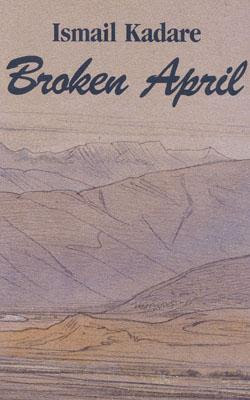I’m always looking through articles and bibliographies on books; searching for new authors and new reading experiences. So when Caustic Cover Critic recommended Broken April in his Best-Books-of-the-Year (2009), I was intrigued.
“It’s very well written, which helps, but the underlying idea is even more fascinating. The setting is Kadare’s native Albania, where the hill-dwelling people have this mad system of honor and code of behaviour called the ‘Kanun’”.
After reading these lines from CCC, I immediately thought of the sequence in Huckleberry Finn where Huck hides in a tree and watches two families (the Grangerfords and the Shepherdsons) murder each other in revenge for even earlier killings and slights of honor. That scene and Twain’s masterfully simple prose, is a lot of what Broken April is about. The difference is that rather than being an outsider looking in at this mad code of family honor, Kadare gives you the perspective of an insider, one of the family members who is questioning the code even as he is driven to honor it.
The story is simple. The central character, 26 year old Gjorg Berisha, is returning to his country village in Albania. He is forced, through the 'Kanun" code, to murder someone in another family in revenge for a previous killing in his own family. The results of his actions, which come as a surprise, places him inside of the very code he wishes he could break out of.
 |
| Ismail Kadare |
Kadare’s theme of how the past influences the present, is so beautifully wound into the story, that you find yourself wondering about your own life; your own family traditions. Blind belief, honor, codes of conduct without compassion, these are the things that make up Broken April. That and compelling characters who the author manages to create empathy for even as they are committing acts of evil.
“A pale young man sits down to an important meal. His brother has been murdered and he waits for a discussion about blood compensation to be over. If it fails, his life will be forfeit, gathered into the cycle of bloodshed as soon as he avenges (as he must) his brother. The provisions of the meal are complicated: eaten at noon with the murderer, it must conclude with the agreement of a blood price and a tour of the house, the male guests stamping their feet in every room to drive out the fued’s shadow. Then the young man’s father carves a cross on the murderer’s door and exchange a final reconciling drop of blood. The price is settled, and the stamping begins”.
The clarity and simplicity of Kadare’s writing are what make the above passage so ominous and frightening. The thoughts and feelings of these characters caught in a murderous web of their own making are always just barely suppressed. No wonder the Shakespearean play Macbeth was a favorite of Ismail’s when he was a child. Broken April is suffused with this kind of barely controlled terror which both frightens and enthralls the reader at the same time.
This is a writer with a profound sense of the past/present and a very deep understanding of human psychology. Although the word is over-used, I think Broken April is a masterpiece that belongs alongside Kafka and Tolstoy and other writers who look sadly upon humanity at its worst in order to free us all to become our best.
I urge you to find a copy of Broken April by Ismail Kadare, or any other works by this remarkable Albanian author.
Notes and links:
- Full bibliography
- Fine forum discussion of Broken April
- Essay on translating Kadare into English
My thanks to Goodreads.com for the cover picture of Broken April.














